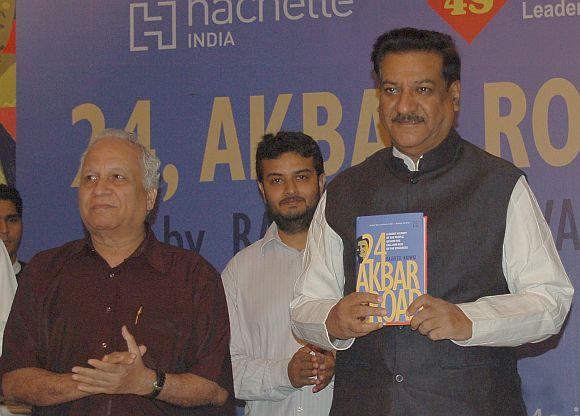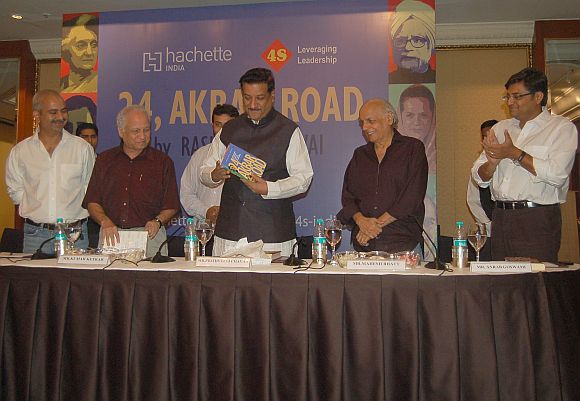
The Congress seems to be ruing what it does not have in UPA II: The support of the left parties, not particularly because they let the government govern till they withdrew support over the issue of signing a nuclear treaty with the US, but because they didn't demand their pound of flesh in the allocation of ministries by not joining the government.
That, in brief, was the purport of what Maharashtra Chief Minister Prithviraj Chavan -- an insider in the PMO during UPA I and part of UPA II till the Adarsh scam catapulted him to the state -- said at the book launch of 24, Akbar Road, authored by The Telegraph's Rashid Kidwai, in an instance of uncharacteristic candour.
Chavan made a number of observations -- some cryptic, some obvious -- while holding his fort in conversation with Kumar Ketkar of Divya Bhaskar, Arnab Goswami of Times Now, film director Mahesh Bhatt, Rashid Kidwai and the audience on a range of issues: the biggest challenge before the Congress in the run up to the 2014 general elections, the compulsions of coalition governments, whether and why the Congress will continue to hold a pre-eminent position in the Indian polity and who bulldozed the continuation of support of the left parties in UPA I.
These comments, nevertheless, were made by the Maharashtra chief minister, only after admitting that he knew accepting to participate in such a book launch was fraught with risk -- one being his views not sounding credible enough in his exposition of his take on 24, Akbar Road, the official headquarter of the Indian National Congress.
"Interestingly, in UPA I we had a large group of left MPs (61) supporting the government from the outside. They could have easily got 10 ministries but they opted to stay out of the government," Chavan wistfully remembered while contemplating the situation the UPA II -- during whose tenure midway the 2G spectrum scam became public and later became the whipping boy of Team Anna -- fins itself in now.
...

In the same breath, Chavan bluntly blamed CPI (M) general secretary Prakash Karat for bringing the curtains down on the continuation of left parties' support to UPA I during the vote on nuclear bill, which too got embroiled in the money-for-vote scandal, adding to UPA II's embarrassment.
"I personally feel that had the Communist Party (CPI-M) not been led by Prakash Karat I don't think things would have gone that far," he added.
Speaking like an authority who had a ringside view of the goings-on of convincing the Left parties that the nuclear bill did not, in any way, jeopardise Indian sovereignty all the while safeguarding its interests, Chavan said he was part of a coordination committee that was set up to negotiate the bill with the left parties.
"It was a very good deal but when Prakash Karat came in he took a very, very hard line. He just wouldn't listen to any of these," he told the audience.
"I am not saying he (Prakash Karat) intended to pull the plug but it so happened he took a very hard line."
Interestingly, replying to a question by Arnab Goswami if the Congress party could do business with the CPI-M if Sitaram Yechury became the general secretary of the party the Maharashtra chief minister, who is considered very close to Congress president Sonia Gandhi, replied in the affirmative setting tongues wagging.
Without naming anybody for the current mess that the UPA II finds itself in, Chavan said that it were the compulsions of coalition politics.
While the presence of the left parties did not let Prime Minister Manmohan Singh and then finance minister P Chidambaram go ahead with reforms in the crucial pension, insurance and banking sector, which could have helped India finance its long-term infrastructural needs, it was the presence of DMK that put the spanner in the divestment of a public sector undertaking in Tamil Nadu during UPA II, Chavan said while explaining how coalition governments function and obstruct governance and reforms and why some crucial reforms in sectors vital for India's economic growth could not move ahead.
"The insurance sector reform, the banking sector reform, pension reforms were not allowed to happen by our left friends in UPA I. The Prime Minister wanted it, P Chidambaram wanted it... for long-term funding we require reforms in these sectors," he said.
...

In his bid to soften some criticism as to why UPA II, without the albatross of the left parties hanging around its neck couldn't speed up the reform process, he said, "But again these decisions could not be taken. A simple decision like disinvesting 10 per cent of a PSU had to be withdrawn because one of the large partners did not agree to it. The plant happened to be in Tamil Nadu and a decision taken by the cabinet had to be reversed because one alliance partner said you can't do it."
Chavan admitted that the biggest challenge before the Congress party, of which many obituaries have been written by political pundits in the aftermath of Anna Hazare's anti-corruption campaign for the passage of the Jan Lokpal Bill, will be to change the perception of the people and convince them to vote on the development and economic agenda and not on emotive issues.
"We are paying a huge price (of leading a coalition government). Huge price in terms on (inadequate) growth, in terms of taking decisions (inadequate governance), in terms of meeting the challenges (weeding out corruption) that we face today."
But he believed that this is just a phase in politics that the party will have to go through. "I am sure people are coming to an awareness that it is always better to vote for one party than to have a mix of many parties like," he said trying to emphasise why the Congress needs to emerge as a party with a simple majority in the 2014 parliamentary elections.
The Congress, he said, has the ability to do just that rejuvenated as it feels by the emergence of a young leadership.
"Congress has been able to throw younger leadership compared to any other party and that is what will help Congress retain its pre-eminence and remain relevant in the future," Chavan said, perhaps indicating that Congress general secretary Rahul Gandhi might play a bigger role in UPA II in the run up to 2014 parliamentary polls.
The Maharashtra chief minister, who is saddled by the weight of coalition compulsions in the state too (the relationship between the Ajit Pawar led Nationalist Congress Party and the Congress) believes that people will not vote on emotional issues in 2014 general elections.
"They will sit back and think coolly about economic issues and development agenda rather than come under the influence of some wave," he said referring to the media-catapulted anti-corruption campaigner Anna Hazare and his team's efforts to undermine his party.
"The Congress party will have to work towards getting that to happen (changing the perception that UPA II is the most corrupt government in the history of independent India) and that I think is the biggest political challenge before the Congress in the run up to the 2014 elections."
That seems like an uphill task but for that to happen Chavan himself needs to change his perception first about UPA II.
As he himself admitted while speaking out his mind on the compulsions of coalition governments, "But in UPA II everybody (coalition partners) had their own share.